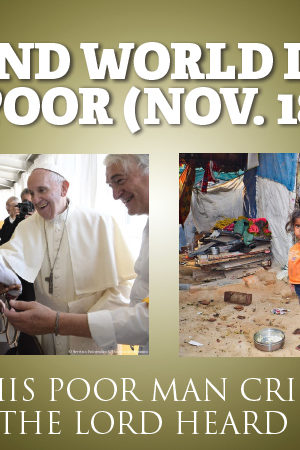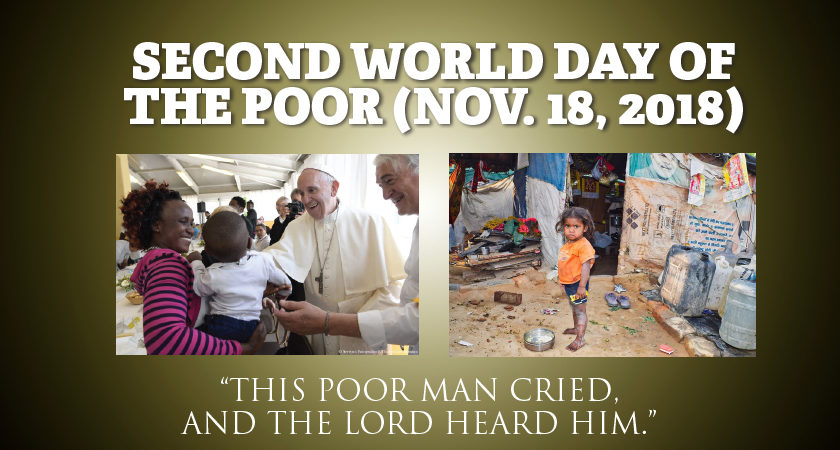“This poor man cried, and the Lord heard him.”
The Holy Father gives us ten guidelines for our life and for keeping the World Day of the Poor in meaningful way. Here is a summary of his letter on this occasion. We have added a title to each paragraph, to help us retain the contents better. (Editor)
- OPEN YOUR EYES: Psalm 34 allows us today, surrounded as we are by many different forms of poverty, to know those who are truly poor. It enables us to open our eyes to them, to hear their cry and to recognize their needs… No one should feel excluded from the Father’s love, especially in a world that often presents wealth as the highest goal and encourages self-centredness.
- POVERTY IS A CRY. WE NEED TO HEAR IT. Psalm 34 uses three verbs to describe the poor man in his relationship with God. First of all, “to cry”. Poverty cannot be summed up in a word; it becomes a cry that rises to heaven and reaches God. What does the cry of the poor express, if not their suffering and their solitude, their disappointment and their hope? We can ask ourselves how their plea, which rises to the presence of God, can fail to reach our own ears, or leave us cold and indifferent. On this World Day of the Poor, we are called to make a serious examination of conscience, to see if we are truly capable of hearing the cry of the poor.To hear their voice, what we need is the silence of people who are prepared to listen. If we speak too much ourselves, we will be unable to hear them. At times I fear that many initiatives, meritorious and necessary in themselves, are meant more to satisfy those who undertake them than to respond to the real cry of the poor. …We are so trapped in a culture that induces us to look in the mirror and pamper ourselves…
- WE NEED TO RESPOND: The second verb is “to answer”…God’s answer to the poor is always a saving act that heals wounds of body and soul, restores justice and helps to live life anew in dignity. God’s answer is also a summons to those who believe in him to do likewise, within the limits of what is humanly possible. The World Day of the Poor wishes to be a small answer that the Church throughout the world gives to the poor. It may well be like a drop of water in the desert of poverty, yet it can serve as a sign of sharing with those in need, and enable them to sense the active presence of a brother or a sister. The poor do not need intermediaries, but the personal involvement of all those who hear their cry. The concern of believers in their regard cannot be limited to a kind of assistance – as useful and as providential as this may be in the beginning – but requires a “loving attentiveness” (Evangelii Gaudium, 199) that honours the person as such and seeks out his or her best interests.
- THE POOR NEED TO BE FREED: The third verb is “to free”. In the Bible, the poor live in the certainty that God intervenes on their behalf to restore their dignity. Poverty is not something that anyone desires, but is caused by selfishness, pride, greed and injustice. These are evils as old as the human race itself, but also sins in which the innocent are caught up, with tragic effects.
- WAITING LIKE BARTIMAEUS: I find it moving to know that many poor people identify with the blind beggar Bartimaeus mentioned by the evangelist Mark (cf. 10:46-52). …How many people today feel in the same situation! Lack of basic means of subsistence, marginalization due to a reduced capacity for work, various forms of social enslavement, despite all our human progress… They are waiting for someone to come up to them and say: “Take heart; rise, he is calling you” (v. 49).… BUT OFTEN DISPPOINTED: Sadly, the exact opposite often happens, and the poor hear voices scolding them, telling them to be quiet and to put up with their lot. These voices are harsh, often due to fear of the poor, who are considered not only destitute but also a source of insecurity and unrest, an unwelcome distraction from life as usual and needing to be rejected and kept afar. We tend to create a distance between them and us, without realizing that in this way we are distancing ourselves from the Lord Jesus.
- THEY NEED OUR PRESENCE: for the poor to overcome their oppressive situation, they need to sense the presence of brothers and sisters who are concerned for them and, by opening the doors of their hearts and lives, make them feel like friends…In many dioceses last year, … many people encountered the warmth of a home, the joy of a festive meal and the solidarity of those who wished to sit together at table in simplicity and fraternity. I would like this year’s, and all future World Days, to be celebrated in a spirit of joy at the rediscovery of our capacity for togetherness. Praying together as a community and sharing a meal on Sunday is an experience that brings us back to the earliest Christian community, described by the evangelist Luke in all its primitive simplicity.
- WE COLLABORATE WITH OTHER GENEROUS PERSONS: Countless initiatives are undertaken every day by the Christian community in order to offer closeness and a helping hand in the face of the many forms of poverty all around us. Often too, our cooperation with other initiatives inspired not by faith but by human solidarity, make it possible for us to provide help that otherwise we would have been unable to offer. The realization that in the face of so much poverty our capacity for action is limited, weak and insufficient, leads us to reach out to others so that, through mutual cooperation, we can attain our goals all the more effectively. … Dialogue between different experiences, and humility in offering our cooperation without seeking the limelight, is a fitting and completely evangelical response that we can give…WITHOUT COMPETITION: In the service of the poor, there is no room for competition…. The poor do not need self-promoters, but a love that knows how to remain hidden and not think about all the good it has been able to do. At the centre must always be the Lord and the poor….Far be it from Christ’s disciples to nurture feelings of disdain or pity towards the poor. Instead, we are called to honour the poor and to give them precedence, out of the conviction that they are a true presence of Jesus in our midst. …
- WE REJECT WORLDLY WAYS: Here we can see how far our way of life must be from that of the world, which praises, pursues and imitates the rich and powerful, while neglecting the poor and deeming them useless and shameful. …
- WITH THE POOR, WE GROW IN HUMANITY: Faith naturally inspires a message of hope. Often it is precisely the poor who can break through our indifference, born of a worldly and narrow view of life. … It is in the measure in which we are able to discern authentic good that we become rich before God and wise in our own eyes and in those of others. It is truly so. To the extent that we come to understand the true meaning of riches, we grow in humanity and become capable of sharing.
- THE POOR TEACH US THE GOSPEL: The poor evangelize us and help us each day to discover the beauty of the Gospel. …
Question for Reflection, Decision and Action:
How will I (or my family, or parish or religious community) live the Day of the Poor this year?
To read the entire article, click Subscribe

